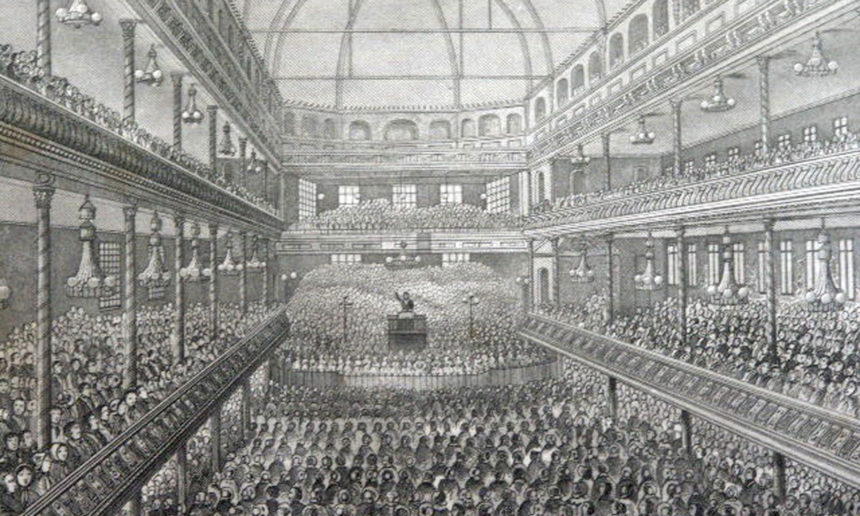Charles Haddon Spurgeon became one of the most influential preachers of the nineteenth century and is still highly regarded to this day. Below are excerpts about his life from Wikipedia.
Brief Bio
Charles Haddon Spurgeon was born in Born in Kelvedon, Essex, The United Kingdom on June 19, 1834 and died in Menton, France on January 31, 1892. He was an English Particular Baptist preacher. Spurgeon remains highly influential among Christians of various denominations, among whom he is known as the “Prince of Preachers”. He was a strong figure in the Reformed Baptist tradition, defending the Church in agreement with the 1689 London Baptist Confession of Faith understanding, and opposing the liberal and pragmatic theological tendencies in the Church of his day.
Look unto me, and be ye saved, all the ends of the earth, for I am God, and there is none else. – Isaiah 45:22, the text that moved Spurgeon to conversion.
Only four years after converting, at age 20, Spurgeon became the pastor of the congregation of the New Park Street Chapel, the largest Baptist church in London and lead there for 38 years. His preaching drew crowds of over 10,000 and later moved the congregation to larger quarters at the Metropolitan Tabernacle.
Controversies
He was part of several controversies with the Baptist Union of Great Britain and later he left the denomination over doctrinal convictions.
Spurgeon alleged that an incremental creeping of the Graf-Wellhausen hypothesis, Charles Darwin’s theory of evolution, and other concepts were weakening the Baptist Union. Spurgeon emphatically decried the doctrine that resulted:
Assuredly the New Theology can do no good towards God or man; it, has no adaptation for it. If it were preached for a thousand years by all the most earnest men of the school, it would never renew a soul, nor overcome pride in a single human heart.
The standoff caused division amongst the Baptists and other non-conformists, and is regarded by many as an important paradigm.
Spurgeon strongly opposed the owning of slaves. He lost support from the Southern Baptists, sales of his sermons dropped to a few, and he received scores of threatening and insulting letters as a consequence.
Not so very long ago our nation tolerated slavery in our colonies. Philanthropists endeavored to destroy slavery; but when was it utterly abolished? It was when Wilberforce roused the church of God, and when the church of God addressed herself to the conflict, then she tore the evil thing to pieces. I have been amused with what Wilberforce said the day after they passed the Act of Emancipation. He merrily said to a friend when it was all done, “Is there not something else we can abolish?” That was said playfully, but it shows the spirit of the church of God. She lives in conflict and victory; her mission is to destroy everything that is bad in the land. The Best Warcry, March 4th, 1883.
Like other Baptists of his time, despite opposing Dispensationalism, Spurgeon anticipated the restoration of the Jews to inhabit the Promised Land.
We look forward, then, for these two things. I am not going to theorize upon which of them will come first – whether they shall be restored first, and converted afterwards – or converted first and then restored. They are to be restored and they are to be converted, too. The Restoration And Conversion of the Jews. Ezekiel 37.1–10, June 16th, 1864.
Spurgeon founded the Stockwell Orphanage, which opened for boys in 1867 and for girls in 1879, and which continued in London until it was bombed in the Second World War. The orphanage became Spurgeon’s Child Care which still exists today. He also founded Spurgeon’s College, which was named after him posthumously.
Spurgeon’s Works
Spurgeon was a great author of many types of works including sermons, one autobiography, commentaries, books on prayer, devotionals, magazines, poetry, hymns, and more. Many sermons were transcribed as he spoke and were translated into many languages during his lifetime. Spurgeon produced powerful sermons of penetrating thought and precise exposition. His oratory skills held his listeners spellbound in the Metropolitan Tabernacle and many Christians hold his writings in exceptionally high regard among devotional literature.
==> Read a selection of Spurgeon’s Gems, by clicking here.


